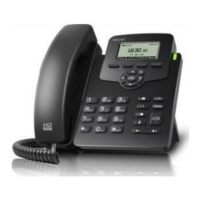points are of the form “xxx000”. The first three bits are the IP precedence bits. These class
selector PHBs retain almost the same forwarding behavior as nodes that implement IP
precedence-based classification and forwarding.
traditional best effort service from a DS-compliant node.
VoIP is extremely bandwidth and delay-sensitive. QoS is a major issue in VoIP implementations,
regarding how to guarantee that packet traffic not be delayed or dropped due to interference
from other lower priority traffic. VoIP can guarantee high-quality QoS only if the voice and the
SIP packets are given priority over other kinds of network traffic. IP phones support the
DiffServ model of QoS.
Voice QoS
In order to make VoIP transmissions intelligible to receivers, voice packets should not be
dropped, excessively delayed, or made to suffer varying delay. DiffServ model can guarantee
high-quality voice transmission when the voice packets are configured to a higher DSCP value.
SIP QoS
SIP protocol is used for creating, modifying and terminating two-party or multi-party sessions.
To ensure good voice quality, SIP packets emanated from IP phones should be configured with
a high transmission priority.
DSCPs for voice and SIP packets can be specified respectively.
Procedure
QoS can be configured using the configuration files or locally.
Configuration File <r0000000000xx>.conf/
<MAC>.conf
Configure the DSCPs for voice packets and SIP
packets.
Local Web User Interface Configure the DSCPs for voice packets and SIP
packets.
Navigate to:
http://<phoneIPAddress>/fcgi/do?id=2&id=2

